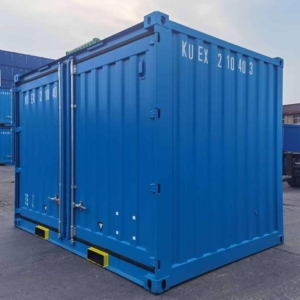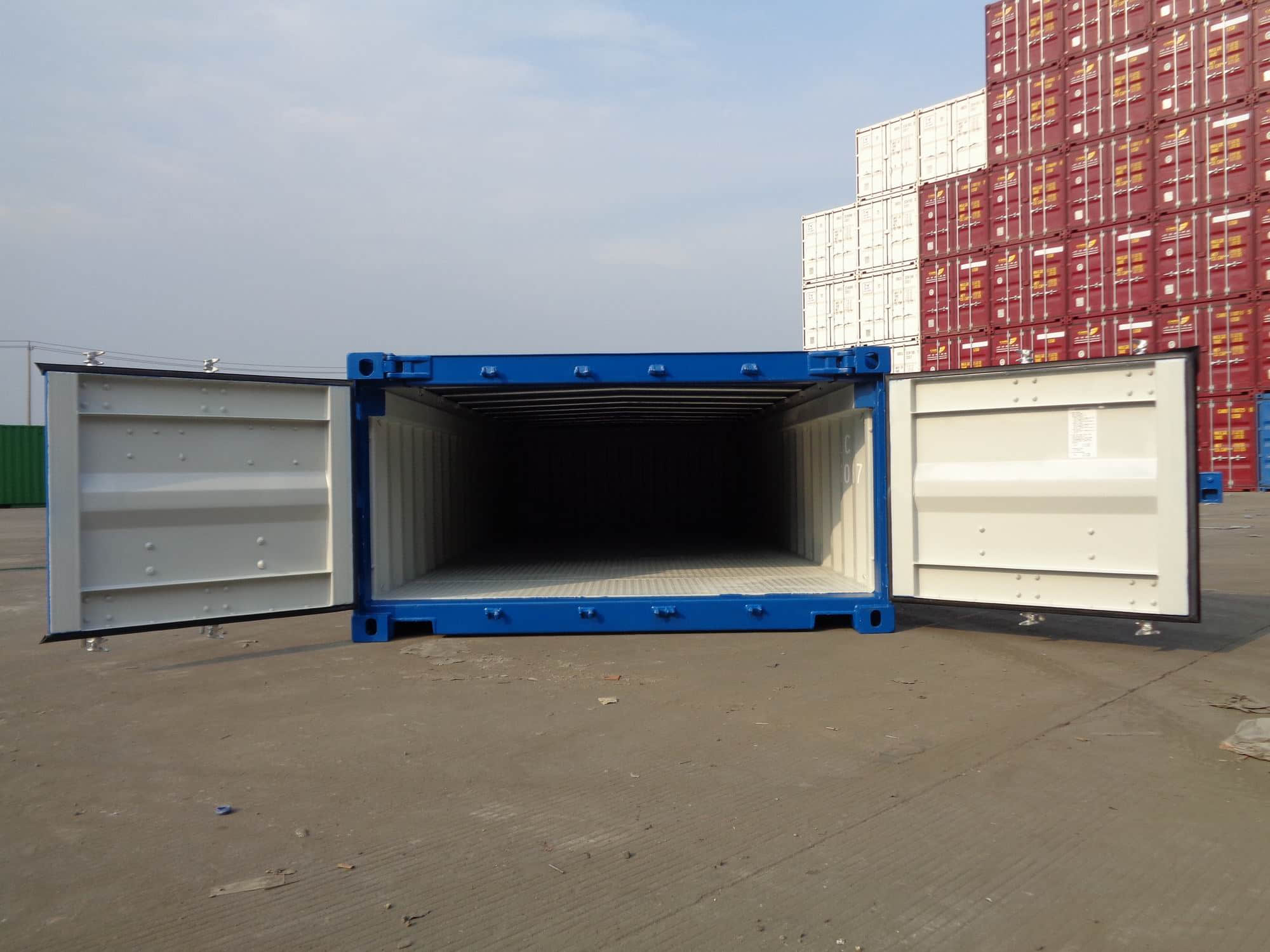I. Introduction
Soft top containers, also known as tarpaulin or tarp-covered containers, are a type of industrial container commonly used for shipping and storing goods. These containers feature a flexible fabric or tarpaulin cover that can be easily opened and closed, providing quick access to the contents inside. The use of They have become increasingly popular in modern industrial applications due to their versatility, cost-effectiveness, and ease of use.
They are designed to protect goods from environmental factors such as rain, dust, and sunlight, making them ideal for outdoor storage and transportation. The flexible nature of the fabric cover allows the container to conform to the shape of the goods inside, maximizing storage space and reducing wasted space. Additionally, they are lightweight and collapsible, making them easy to transport and store when not in use.

II. Industries Utilizing Soft Top Containers
Soft top containers, also known as flexible intermediate bulk containers (FIBCs) or bulk bags, are widely utilized across various industries for their versatility, efficiency, and cost-effectiveness. Here’s a detailed exploration of how different industries utilize it:
A. Food and Beverage Industry:
1. They are commonly used for transporting liquids such as juices, oils, and syrups. These containers are designed to be leak-proof, ensuring that the contents remain secure during transit.
2. The use of soft top containers in the food and beverage industry helps preserve the quality and freshness of perishable goods. The containers provide a protective barrier against external contaminants, ensuring that the products reach consumers in optimal condition.
B. Pharmaceutical Industry:
1. They play a crucial role in pharmaceutical packaging, especially for powders, granules, and other bulk materials. These containers are designed to meet stringent hygiene and safety standards to protect the integrity of pharmaceutical products.
2. They help maintain product integrity by providing a secure and contamination-free environment. Their flexible design allows for easy handling and transportation of pharmaceutical products, reducing the risk of damage or spoilage.
C. Chemical Industry:
1. They are widely used in the chemical industry for the transportation of hazardous materials. These containers are designed to withstand the rigors of chemical handling and provide a safe and secure way to transport hazardous chemicals.
2. The use of soft top containers in the chemical industry helps minimize the risk of spills and leaks, ensuring the safety of workers and the environment. These containers are designed to meet strict regulatory standards for the transportation of hazardous materials.
D. Agricultural Industry:
1. They are commonly used in the agricultural industry for the storage and transportation of bulk agricultural products such as grains, seeds, and fertilizers. These containers are designed to withstand the weight and pressure of bulk materials while providing easy access for loading and unloading.
2. They help reduce product damage and spoilage by providing a protective barrier against moisture, pests, and contaminants. They are also reusable and recyclable, making them a sustainable packaging solution for the agricultural industry.
III. Advantages of Soft Top Containers
They offer several advantages that make them a popular choice for shipping and storage needs. These advantages stem from their unique design and construction, which provide flexibility, cost-effectiveness, and environmental sustainability.
A. Flexibility and Versatility:
1. Customizable Sizes: They can be tailored to specific size requirements, making them suitable for a wide range of cargo types and quantities. This flexibility allows for efficient use of space and optimal loading of goods.
2. Easy Access: The soft top design of these containers allows for easy access to the contents, simplifying the loading and unloading process. This is particularly beneficial for goods that require frequent access or monitoring during transit.
3. Compatibility: They are compatible with various transportation modes, including trucks, trains, and ships. This versatility makes them an ideal choice for multimodal transport operations.
4. Collapsible Design: Some soft top containers feature a collapsible design, allowing them to be folded and stored when not in use. This saves space and reduces storage costs, making them a cost-effective option for businesses.

B. Cost-Effectiveness:
1. Reduced Weight: They are typically lighter than traditional rigid containers, reducing transportation costs, especially in air freight or long-distance shipping.
2. Lower Maintenance Costs: The flexible nature of it means they are less prone to damage from impacts or rough handling. This can result in lower maintenance and repair costs over time.
3. Reusability: They are durable and can withstand multiple uses, reducing the need for frequent replacements. This contributes to cost savings and reduces waste.
4. Efficient Packing: The flexibility of soft top containers allows for efficient packing of goods, maximizing the use of available space. This can lead to lower shipping costs per unit of cargo.
C. Environmental Sustainability:
1. Recyclable Materials: Many soft top containers are made from recyclable materials, such as polyester fabric and steel frames. This makes them a more environmentally friendly option compared to single-use packaging materials.
2. Reduced Waste: The reusability of they helps reduce waste generation, as they can be used multiple times before reaching the end of their service life.
3. Energy Efficiency: The lighter weight of soft top containers compared to rigid containers can lead to fuel savings and reduced carbon emissions during transportation.
4. Compliance with Regulations: They are designed to meet international shipping regulations and standards, ensuring safe and environmentally responsible transportation of goods.
IV. Challenges and Considerations
A. Maintenance and Cleaning
They require regular maintenance and cleaning to ensure their longevity and functionality. Due to their fabric-based construction, they are prone to accumulating dirt, dust, and moisture, which can affect their performance and structural integrity over time. Proper cleaning methods, such as using mild detergent and water, should be employed to remove any debris and stains from the fabric. Additionally, regular inspections should be conducted to check for any signs of wear and tear, such as tears or loose stitching, which should be repaired promptly to prevent further damage.
B. Durability and Longevity
Durability is a critical consideration when utilizing soft top containers, particularly in industrial and commercial settings where they face rough handling and harsh environmental conditions. The fabric should be robust, resistant to tearing, abrasion, and UV damage. Reinforcements, such as steel frames or bars, can enhance the container’s strength and stability. Regular inspections and maintenance can prolong its lifespan, ensuring it remains functional and safe for an extended period.
C. Regulatory Compliance
They used for shipping and storage must comply with various regulations and standards to ensure their safety and suitability for use. These regulations may include requirements for load capacity, structural integrity, and fire resistance. It is essential to ensure that the soft top container meets all relevant regulations and undergoes regular inspections and certifications to maintain compliance. Failure to comply with regulations can result in fines, legal issues, and safety hazards, highlighting the importance of adhering to industry standards when using it.
V. Conclusion
Soft top containers are highly versatile and durable solutions for shipping, storage, and transportation needs, offering a cost-effective and sustainable alternative. Their customizable design and ability to withstand harsh conditions make them suitable for various industries. The future outlook for it is positive, with continued growth expected as businesses seek more flexible and eco-friendly solutions. Innovations in materials and design are likely to further enhance their performance and make them an increasingly popular choice in the future.
CIMC Yang Zhou Base is a leading manufacturer of soft top containers and various other standard and special logistics equipment. With years of experience in the industry, it focuses on the design, production and distribution of high-quality innovative products that meet the specific needs of customers.
冷蔵コンテナ、コールドチェーン設備、コンテナ型設備統合、モジュール式建物など、高品質で革新的な物流設備が必要な場合、 CIMC Yang Zhou Base はあなたの最良の選択です。世界中のお客様からのお問い合わせを歓迎し、あなたと協力する機会を楽しみにしています。


